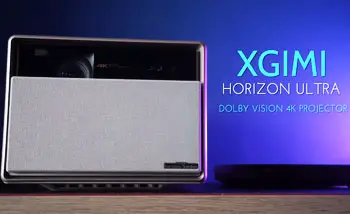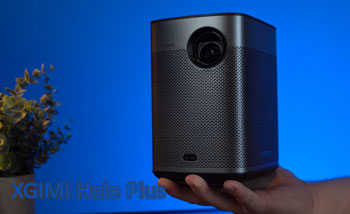Looking for an ultra-portable projector that can handle both movies and games? The XGIMI Horizon and Halo Plus are two top contenders that pack impressive projection and smart software into compact sizes.
This in-depth comparison examines how the XGIMI Horizon and Halo Plus models stack up for features, performance, and overall value. Read on to see which mini projector comes out on top.
A Brief Comparison Table
| Features | XGIMI Horizon | Halo Plus |
| Native Resolution | 1080p | 1080p |
| Brightness | 900 ANSI Lumens | 800 ANSI Lumens |
| Contrast Ratio | 1000000:1 | 1200000:1 |
| Android TV | Built-in | Built-in |
| Speakers | 2x 3W Harman Kardon | 2x 5W |
Overview of the XGIMI Horizon
The XGIMI Horizon delivers a bright 1080p picture and Android TV in a highly portable form factor. Some of its highlights include:

- Bright 900 lumen output for a 110” projection size
- Native 1080p resolution and HDR10 support
- Android TV provides access to streaming apps and Google Assistant
- Auto focus and auto keystone ensure a square image
- 2x 3W Harman Kardon speakers with Dolby Audio
- Battery lasts around 2.5 hours for portable use
Weighing just 2.2 pounds, the Horizon produces an impressively large projection up to 300” from a package smaller than a book. The built-in Android TV makes it easy to stream movies or shows from virtually anywhere.
It’s a versatile projector great for both big screen mobile entertainment and more permanent home theater setups.
Overview of the XGIMI Halo Plus
The Halo Plus comes from XGIMI’s newer lineup of compact 1080p projectors with Android smarts. Key details of the Halo Plus include:
- 800 ANSI lumen brightness still nets a 100″ image
- Impressive 1,200,000:1 contrast ratio for deep blacks
- Android 10 OS provides full access to Google Play apps
- Auto focus, auto keystone, and auto screen alignment
- 2x 5W speakers with Dolby Atmos support
- Battery lasts 2-3 hours on a charge
While not as bright as the Horizon, the more affordable Halo Plus still outputs an extremely watchable Full HD picture. And it shares the excellent Android streaming capabilities in a hip, minimalist design.
For the price, you get awesome projection and software in an ultra-portable package.
Also Read: Comparison Between the EF-100W and EF-12
Key Differences Between XGIMI Horizon and Halo Plus
Now that we’ve covered the basics of each projector, let’s dive into a detailed feature-by-feature comparison between the XGIMI Horizon and Halo Plus.
- Picture Brightness
The Horizon outputs 900 ANSI lumens compared to the Halo Plus’ 800 lumens. That 100 lumen difference allows the Horizon to create a slightly larger projected image, especially in rooms with more ambient light.
Both can easily fill a 100-120” screen. But the Horizon has an easier time filling larger screens up to 150” without looking dim. For serious home theater setups, that extra brightness is beneficial.
- Resolution & Image Quality

You’re getting full native 1080p resolution from both models for a detailed picture. The Horizon supports HDR10 for expanded contrast when viewing compatible content.
Between the two, the Horizon seems to produce somewhat sharper, clearer images thanks to the higher lumen output. But side-by-side the difference is minimal. You’ll get great picture quality from either.
- Contrast Ratio
Here the Halo Plus pulls ahead with an impressive 1,200,000:1 contrast versus 1,000,000:1 on the Horizon. Those deep blacks really make images pop with vibrancy.
So when viewing darker movies or playing games with shadowy scenes, the Halo Plus renders details a bit better. But for most content, contrast is perfectly good on the Horizon too.
- Speakers & Sound Quality
Both models pack twin speaker drivers, but the Halo Plus again wins out with 2x 5W speakers versus 2x 3W on the Horizon.
That extra power allows the Halo Plus to get louder and maintain clarity at higher volumes. The Dolby Atmos support also adds more immersive surround effects.
You can connect external speakers if needed. But out of the box, audio quality is superior on the Halo Plus.
- Ease of Setup & Portability
For setting up quickly anywhere, the Horizon and Halo Plus are evenly matched thanks to auto focus, auto keystone correction, and easy WiFi connectivity. You can get streaming a show or movie in just minutes.
Portability is also comparable, with both weighing around 2.2 pounds. The Horizon is perhaps a bit more compact while the Halo Plus has a sleek, trendy aesthetic.
For on-the-go use, you won’t go wrong with either. The Horizon does get slightly longer battery life at 2.5 hours versus 2-3 hours on the Halo Plus.
- Price
The XGIMI Horizon sells for around $650 while the newer Halo Plus retails closer to $550. That $100 savings does net you marginally lower brightness and battery life compared to the Horizon.
But you get the sleeker design and improved sound quality – arguably better value depending on your needs. If your budget can accommodate it, the brightness upgrade with the Horizon is nice to have.
Also Read: Is JVC NZ7 Better Than NZ8?
Frequently Asked Questions (FAQs)
The main differences between the standard Halo and Halo Plus from XGIMI include: Brightness: Halo Plus has 800 lumens Vs. 720 lumens on the Halo, Resolution: Halo Plus bumps up to native 1080p from the Halo’s 720p, Speakers: Halo Plus doubles the speaker power to 2x 5W drivers, Software: Halo Plus runs the newer Android 10 while Halo uses Android 9. So in summary, the Halo Plus upgrades to a brighter, sharper Full HD picture along with louder sound. But core features like auto focus and Android OS remain consistent between the two.
Yes, the XGIMI Halo Plus comes with the full suite of Android TV apps, including Netflix. You can download the Netflix app from the Google Play store and sign in to your account to stream movies and shows. The built-in Chromecast support also allows casting content from your mobile device to the Halo Plus.
Some of XGIMI’s main competitors in the portable projector space include Anker’s Nebula brand, LG’s PuriCare projector series, and Optoma portable projectors. These all offer similar compact form factors with built-in streaming software. Lower end competitors are cheaper Chinese brands like Yaber and Vankyo. However, XGIMI remains a leader in Mini LED projection paired with intelligent software in an ultra-portable package.
The key differences between the Horizon FHD and Horizon 4K models are: Resolution: Horizon FHD is native 1080p, Horizon 4K is native 4K. Brightness: Horizon FHD has 900 lumens, Horizon 4K has 1500 lumens. Contrast: Horizon FHD is 1,000,000:1, Horizon 4K is 2,000,000:1. Price: Horizon FHD costs around $650, Horizon 4K costs $1,500. So in summary – the 4K model lives up to its name with a sharper Ultra HD picture, significantly higher brightness, and doubled contrast ratio. But that performance comes at a much higher cost. The FHD still delivers amazing projection at a more affordable price point.
Also Read: A Detailed Comparison Between Epson EF11 And EF12.
Final Thoughts
You can’t go wrong with either the impressive XGIMI Horizon or more affordable Halo Plus. Both pack excellent 1080p projection and Android TV into amazingly compact housings.
If you want maximum brightness for larger screen sizes, especially in rooms with ambient light, then the Horizon provides that performance jump.
But the Halo Plus remains a killer value option. You get excellent picture quality and usability for hundreds less. For smaller spaces that don’t demand extreme lumen output, the Halo Plus gets the job done beautifully.
Both XGIMI models supply awesome smart projection in wonderfully portable packages. Pick the one that best fits your needs and budget to take your movies, games, and more to big screen levels wherever you go.

